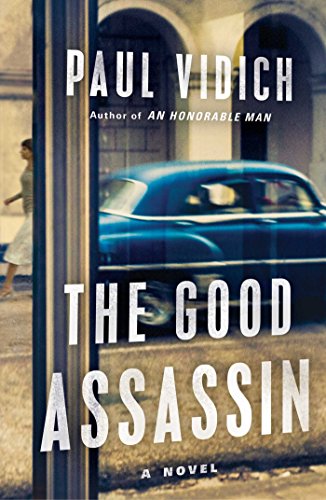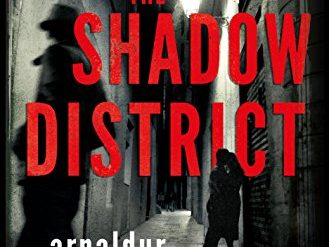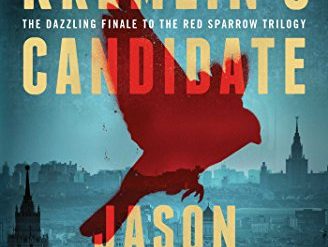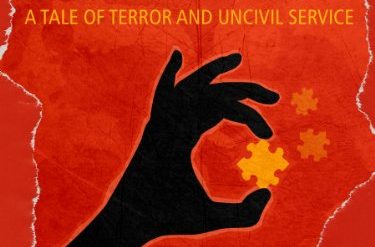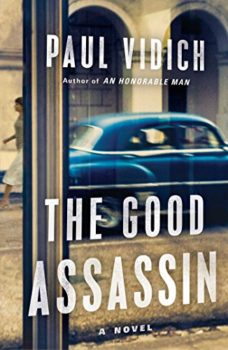
Estimated reading time: 4 minutes
In An Honorable Man, the debut novel by Paul Vidich, we meet George Mueller. In my review of Vidich’s first novel, An Honorable Man (The Cold War, the early CIA, and the McCarthy Era), I described him as “a veteran officer in the early CIA who is honorable only in an ironic sense. The world he inhabits, and the life he lives, are fraught with dreadful expectations and impossible choices.”
In Vidich’s captivating second novel, The Good Assassin, Mueller has been retired from the agency for five years. He is teaching Shakespeare at his alma mater, Yale University, when the director of the CIA approaches him to take on an assignment in Cuba. There, he is to track down an old acquaintance, Toby Graham. The director seems to suspect that Toby may not be following orders. Mueller is to find out “what’s on his mind.”
The Good Assassin (George Mueller #2) by Paul Vidich (2017) 269 pages ★★★★☆
The action unfolds in the closing weeks of 1958, as the Cuban Revolution is heading toward its climax on New Year’s Day, 1959. Traveling under cover as a travel writer for Holiday magazine, Mueller circulates through Havana with a freelance photographer in tow. She is an attractive young woman with whom, unsurprisingly, he ends up in bed. And it turns out that she is friendly with a married American couple who have purchased land for a cattle ranch nearby. Mueller knows them both: he and Jack Malone both attended Yale, as did Graham, and Jack’s unhappy wife, Liz, had once slept with Mueller. Together with Graham, the four—Mueller, Jack, Liz, and Katie Laurent, the photographer—wind up spending a great deal of time together as Liz and Jack’s marriage steadily disintegrates. The five are drawn closer together by the civil war spiraling out of control all around them.
A CIA veteran with a violent past and a troubled mind
Graham is the “good assassin” of the novel’s title. He is a veteran officer of the CIA with a violent past and a troubled mind. Among many other assignments, Graham had helped engineer the overthrow of Jacobo Arbenz, the elected socialist president of Guatemala.
In a long conversation with Mueller, Graham conveys his discontent with the agency’s coup there. “I was in the room. Men died. It was all concocted by ambitious men thinking they were playing a Cold War board game. Do you know what I’m talking about? It was a feeling I got—hard to put into words—these perfectly decent Ivy Leaguers at their desks writing memos on extreme interrogation and assassination. We were given a manual on the best ways to extract a man’s eyes to keep him alive, but blind, one eye at a time, to get a confession. Decent men, ambitious men, who were asked to rationalize assassinations, so they wrote a manual on the most effective way to kill. I got the manual in Guatemala.”
Sadly, as the author well knows, the CIA did indeed create such a manual. (You can read it here.) The manual was made public in 1997 as the result of a Freedom of Information Act request. In Cuba, however, Toby’s loyalties are unclear. He appears to be smuggling guns into the country—but it’s unclear for a time who is receiving them. Only gradually does Mueller learn the truth about Toby’s activities in the country.
For related reading
I’ve also reviewed four other excellent historical spy novels by Paul Vidich:
- An Honorable Man (The Cold War, the early CIA, and the McCarthy Era)
- The Mercenary (A superb Cold War thriller from Paul Vidich)
- The Coldest Warrior (Project MK-Ultra and the scientist who fell to his death)
- The Matchmaker: A Spy in Berlin (A dangerous spy game in Berlin before the fall of the Wall)
And you can find all of Vidich’s books at A newcomer who writes superb spy novels.
You might also enjoy my posts:
- The 15 best espionage novels
- Good nonfiction books about espionage
- The best spy novelists writing today
- Top 10 mystery and thriller series
If you enjoy reading history in fictional form, check out Top 10 historical mysteries and thrillers.
For reviews of a series of other novels that overlap this historical period, see Olen Steinhauer’s brilliant Yalta Boulevard cycle set in Eastern Europe.
And you can always find my most popular reviews, and the most recent ones, on the Home Page.

